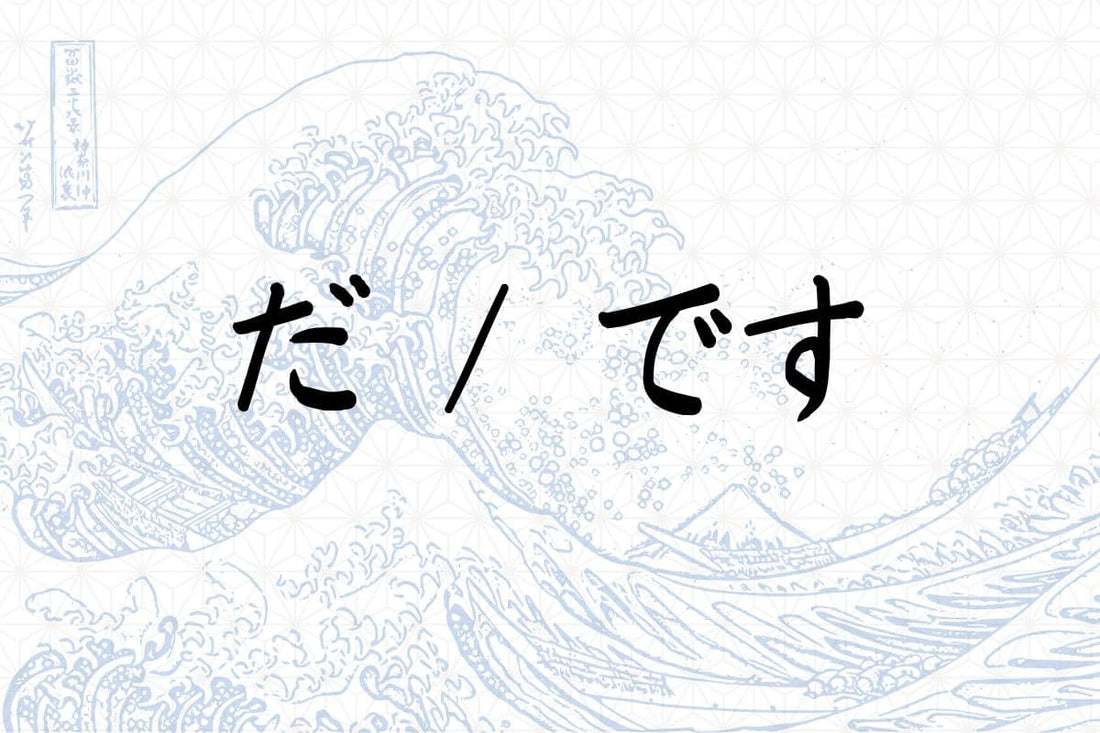
Understanding だ (da) and です (desu) in Japanese: Meaning and Usage
Share
When learning Japanese, one of the first things you’ll come across is だ (da) and です (desu). These words don’t have a direct equivalent in English, but they function like the verb “to be” in most cases.
Understanding the difference between だ and です is important because they affect the politeness level of your sentences. This lesson will explain when to use each one, their conjugations, and common mistakes.
1. What Are だ and です?
In Japanese, だ and です are copula (words that link a subject to a description or identity).
- だ is casual and used in informal conversations.
- です is polite and used in formal situations.
- They attach to nouns and na-adjectives to form statements.
Examples:
Casual:
これは本だ。
これは ほん だ。
Kore wa hon da.
(This is a book.)
Polite:
これは本です。
これは ほん です。
Kore wa hon desu.
(This is a book.)
Casual:
彼は先生だ。
かれ は せんせい だ。
Kare wa sensei da.
(He is a teacher.)
Polite:
彼は先生です。
かれ は せんせい です。
Kare wa sensei desu.
(He is a teacher.)
2. When to Use だ and です
1) Politeness Levels
- Use です when speaking formally, like with strangers, teachers, or colleagues.
- Use だ when speaking casually with friends and family.
2) Sentence Types
- だ and です only attach to nouns and na-adjectives.
- Never use them with i-adjectives because i-adjectives already include a copula in their form.
Incorrect Usage with i-adjectives:
❌ 彼は大きいだ。
かれ は おおきい だ。
Kare wa ookii da.
(Incorrect)
✅ 彼は大きい。
かれ は おおきい。
Kare wa ookii.
(Correct)
✅ 彼は大きいです。
かれ は おおきい です。
Kare wa ookii desu.
(Correct in polite speech)
3. Negative Forms
Casual:
- だ → じゃない / ではない
- da → janai / de wa nai
Polite:
- です → ではありません / じゃありません
- desu → de wa arimasen / ja arimasen
Examples:
Casual:
これは本じゃない。
これは ほん じゃない。
Kore wa hon janai.
(This is not a book.)
Polite:
これは本ではありません。
これは ほん では ありません。
Kore wa hon de wa arimasen.
(This is not a book.)
4. Past Tense
Casual:
- だ → だった
- da → datta
Polite:
- です → でした
- desu → deshita
Examples:
Casual:
これは本だった。
これは ほん だった.
Kore wa hon datta.
(This was a book.)
Polite:
これは本でした。
これは ほん でした.
Kore wa hon deshita.
(This was a book.)
5. Negative Past Tense
Casual:
- だ → じゃなかった / ではなかった
- da → janakatta / de wa nakatta
Polite:
- です → ではありませんでした / じゃありませんでした
- desu → de wa arimasen deshita / ja arimasen deshita
Examples:
Casual:
これは本じゃなかった。
これは ほん じゃなかった。
Kore wa hon janakatta.
(This was not a book.)
Polite:
これは本ではありませんでした。
これは ほん では ありませんでした。
Kore wa hon de wa arimasen deshita.
(This was not a book.)
6. Special Cases
1) Omitting だ in Casual Speech
In casual speech, だ is sometimes left out, especially in short, simple statements.
✅ これは本だ。→ これは本。 (This is a book.) [Both are natural in casual speech.]
However, だ is usually needed when talking about people or making structured statements.
❌ 彼は先生。 (He is a teacher.) [Sounds unnatural.]
✅ 彼は先生だ。 (He is a teacher.) [Correct and natural.]
A good rule of thumb:
- For objects and simple facts → Omitting だ is fine.
- For people or structured explanations → Keep だ.
2) Using だ with Questions
だ is not typically used in questions. Instead, なの is used for casual speech.
❌ これは本だか? (Incorrect)
✅ これは本なの? (Correct, casual)
✅ これは本ですか? (Correct, polite)
3) Sentence Endings with よ and ね
だ is sometimes omitted at the end of a sentence when using よ or ね, especially in very casual speech, and/or to soften the tone.
✅ これは便利よ。
これは べんり よ。
Kore wa benri yo.
(This is convenient!)
✅ これは静かね。
これは しずかね。
Kore wa shizuka ne.
(It’s quiet here, isn’t it?)
7. Common Mistakes
1) Using だ after an i-adjective
- ❌ Wrong: 彼は大きいだ。
- ✅ Correct: 彼は大きい。
2) Using です after an i-adjective in casual speech
- ❌ Wrong: 彼は大きいです。(When speaking casually)
- ✅ Correct: 彼は大きい。
3) Using だ in a formal sentence
- ❌ Wrong: これは本だ。 (When speaking politely)
- ✅ Correct: これは本です。
8. Example Dialogue
Casual Speech
A: これは何?
これは なに?
Kore wa nani?
(What is this?)
B: 本だ。
ほん だ。
Hon da.
(It’s a book.)
A: そうか。
そうか。
Sou ka.
(Oh, I see.)
Polite Speech
A: これは何ですか?
これは なん ですか?
Kore wa nan desu ka?
(What is this?)
B: 本です。
ほん です。
Hon desu.
(It’s a book.)
A: そうですか。
そう ですか。
Sou desu ka.
(Oh, I see.)
9. Summary
- だ is casual, です is polite.
- Used with nouns and na-adjectives, not i-adjectives.
- Negative: じゃない / ではありません.
- Past: だった / でした.
- Negative past: じゃなかった / ではありませんでした.
- ですか is used for polite questions, but なの? is used in casual speech.
Related Posts
-
![~に来る – Expressing ‘Come to Do (Something)’ in Japanese [JLPT N5]](//hirakan.com/cdn/shop/articles/ni-kuru-come-to-co.jpg?v=1769937520&width=170)
~に来る – Expressing ‘Come to Do (Something)’ in Japanese [JLPT N5]
Quick Summary Meaning: ~に来る (~にくる) shows that someone comes to a place in order to do something. How to Us...
-
![~に行く – Expressing ‘Go Somewhere to Do Something’ in Japanese [JLPT N5]](//hirakan.com/cdn/shop/articles/ni-iku-go-somewhere-to-do-something.jpg?v=1769937474&width=170)
~に行く – Expressing ‘Go Somewhere to Do Something’ in Japanese [JLPT N5]
Quick Summary Meaning: “Go to do (something).” You move to a place, and your main purpose is to do that action ...
-
![~にあります/~にいます – Saying Where Things and People Are in Japanese [JLPT N5]](//hirakan.com/cdn/shop/articles/ni-arimasu-imasu-location-of-existence.jpg?v=1769251504&width=170)
~にあります/~にいます – Saying Where Things and People Are in Japanese [JLPT N5]
Quick Summary Meaning: ~にあります/~にいます tells you where something or someone “exists” or “is located.” How to ...
-
![~がある・~がいる – Talking About What Exists in Japanese [JLPT N5]](//hirakan.com/cdn/shop/articles/ga-aru-iru-there-is-are.jpg?v=1769251452&width=170)
~がある・~がいる – Talking About What Exists in Japanese [JLPT N5]
Quick Summary Meaning: ~がある and ~がいる mean “there is / there are” or “to exist / to be (somewhere).” ある is for t...
-
![~すぎる – Saying Something Is “Too Much” in Japanese [JLPT N5]](//hirakan.com/cdn/shop/articles/sugiru-too-much.jpg?v=1769251408&width=170)
~すぎる – Saying Something Is “Too Much” in Japanese [JLPT N5]
Quick Summary Meaning: ~すぎる (~sugiru) means “too much” or “excessive.” It shows that something goes beyond a no...
-
![~く/~になる/~くする – Expressing Change with Adjectives in Japanese [JLPT N5]](//hirakan.com/cdn/shop/articles/ku-naru-suru-expressing-change.jpg?v=1769251371&width=170)
~く/~になる/~くする – Expressing Change with Adjectives in Japanese [JLPT N5]
Quick Summary Meaning: ~く/~になる/~くする lets you talk about how things change in state: “become ~,” “get ~,” or “make som...
-
![な形容詞 (Na-adjectives) – Basic Forms with です in Japanese [JLPT N5]](//hirakan.com/cdn/shop/articles/na-keiyoushi-basic-desu-forms.jpg?v=1769251316&width=170)
な形容詞 (Na-adjectives) – Basic Forms with です in Japanese [JLPT N5]
Quick Summary Meaning: な形容詞 (na-adjectives) are adjectives that describe what something or someone is like, sim...
-
![イ形容詞 – Basic i-Adjective Conjugations in Japanese [JLPT N5]](//hirakan.com/cdn/shop/articles/i-adjectives.jpg?v=1769251251&width=170)
イ形容詞 – Basic i-Adjective Conjugations in Japanese [JLPT N5]
Quick Summary Meaning: イ形容詞 (i-adjectives) are adjectives that end in い and describe how something is, like “big,” “q...
-
![~ます – Polite Present and Past Verb Forms in Japanese [JLPT N5]](//hirakan.com/cdn/shop/articles/masu_-_polite_verb_form.jpg?v=1767433709&width=170)
~ます – Polite Present and Past Verb Forms in Japanese [JLPT N5]
Quick Summary Meaning: The endings ~ます/~ません/~ました/~ませんでした make verbs polite in Japanese (present/future and past...
-
![よ – Adding Friendly Emphasis in Japanese [JLPT N5]](//hirakan.com/cdn/shop/articles/yo_-_ending_particle_Friendly_Emphasis.jpg?v=1767433517&width=170)
よ – Adding Friendly Emphasis in Japanese [JLPT N5]
Quick Summary Meaning: The sentence-ending particle よ adds light emphasis. It shows new information, your strong opin...
-
![ね – Softly Seeking Agreement in Japanese [JLPT N5]](//hirakan.com/cdn/shop/articles/ending_particle.jpg?v=1766907843&width=170)
ね – Softly Seeking Agreement in Japanese [JLPT N5]
Quick Summary Meaning: The particle ね is used at the end of a sentence to gently seek agreement, confirmation, ...
-
![何・だれ・いつ・どこ・どう – Basic Question Words in Japanese [JLPT N5]](//hirakan.com/cdn/shop/articles/Question_Words.jpg?v=1766907708&width=170)
何・だれ・いつ・どこ・どう – Basic Question Words in Japanese [JLPT N5]
Quick Summary Meaning: These are basic Japanese “wh-words” like “what, who, when, where, how, why, how much, ho...
-
![ここ・そこ・あそこ・どこ – Talking About Places in Japanese [JLPT N5]](//hirakan.com/cdn/shop/articles/places_fb57172a-7d06-47ee-a9b7-c1f4b6b2b264.jpg?v=1766305419&width=170)
ここ・そこ・あそこ・どこ – Talking About Places in Japanese [JLPT N5]
Quick Summary Meaning: ここ (koko) = here, そこ (soko) = there (near you), あそこ (asoko) = over there (far from both)...
-
![この・その・あの・どの – Using ‘This / That / Which’ with Nouns in Japanese [JLPT N5]](//hirakan.com/cdn/shop/articles/acd351ada3fe4b04ae86de788a3350b8.jpg?v=1766305268&width=170)
この・その・あの・どの – Using ‘This / That / Which’ with Nouns in Japanese [JLPT N5]
Quick Summary Meaning: この (kono), その (sono), あの (ano), どの (dono) mean “this / that / which” when they come dire...
-
![これ・それ・あれ・どれ – Saying ‘This / That / Which One’ in Japanese [JLPT N5]](//hirakan.com/cdn/shop/articles/this-that.jpg?v=1766305107&width=170)
これ・それ・あれ・どれ – Saying ‘This / That / Which One’ in Japanese [JLPT N5]
Quick Summary Meaning: これ (kore), それ (sore), あれ (are), and どれ (dore) all mean “this / that / which (one)” when you ar...
-
![か~か – Expressing Choices like “A or B” in Japanese [JLPT N5]](//hirakan.com/cdn/shop/articles/choices.jpg?v=1766304827&width=170)
か~か – Expressing Choices like “A or B” in Japanese [JLPT N5]
Quick Summary Meaning: The pattern か~か shows a simple choice: “A or B.” How to Use: Put か after each optio...
-
![~から~まで – Saying “From A to B” in Japanese [JLPT N5]](//hirakan.com/cdn/shop/articles/from-AtoB.jpg?v=1765093560&width=170)
~から~まで – Saying “From A to B” in Japanese [JLPT N5]
Quick Summary Meaning: ~から~まで shows the starting point and ending point of something: “from A to B.” It is ofte...
-
![まで – Expressing “Until” and “Up To” in Japanese [JLPT N5]](//hirakan.com/cdn/shop/articles/until-up-to.jpg?v=1765093405&width=170)
まで – Expressing “Until” and “Up To” in Japanese [JLPT N5]
Quick Summary Meaning: まで (made) means “until” or “up to” and shows a limit of time, place, number, or even act...
-
![から – Expressing “Because” and “From/Since” in Japanese [JLPT N5]](//hirakan.com/cdn/shop/articles/because-from_since.jpg?v=1765093285&width=170)
から – Expressing “Because” and “From/Since” in Japanese [JLPT N5]
Quick Summary Meaning: から shows a reason (“because”) or a starting point (“from / since”). How to Use: Put...
-
![や – Listing Examples with “And, Among Others” in Japanese [JLPT N5]](//hirakan.com/cdn/shop/articles/and.jpg?v=1765093138&width=170)
や – Listing Examples with “And, Among Others” in Japanese [JLPT N5]
Quick Summary Meaning: や connects two or more nouns and means “and” or “among other things.” It shows that your lis...
-
![か – Forming Questions and Saying “Or” in Japanese [JLPT N5]](//hirakan.com/cdn/shop/articles/ka-questions.jpg?v=1763787134&width=170)
か – Forming Questions and Saying “Or” in Japanese [JLPT N5]
Quick Summary Meaning: The particle か turns a sentence into a question, or can mean “or” when choosing between thin...
-
![も – Saying “Also” and “Too” in Japanese [JLPT N5]](//hirakan.com/cdn/shop/articles/mo-also-too_99f908e6-78d0-4f82-8319-391ef42764bc.jpg?v=1763787251&width=170)
も – Saying “Also” and “Too” in Japanese [JLPT N5]
Quick Summary Meaning: The particle も means “also,” “too,” or “even.” It shows that something is the same as someth...
-
![と – Linking 'And', 'With', and Quotations in Japanese [JLPT N5]](//hirakan.com/cdn/shop/articles/to-and-with-quotation.jpg?v=1763265110&width=170)
と – Linking 'And', 'With', and Quotations in Japanese [JLPT N5]
Quick Summary Meaning: と links things like “A and B,” marks doing something with someone, and shows a quotation (“…,”...
-
![で – Marking Where and How an Action Happens in Japanese [JLPT N5]](//hirakan.com/cdn/shop/articles/de-where-how-action-happens.jpg?v=1763264973&width=170)
で – Marking Where and How an Action Happens in Japanese [JLPT N5]
Quick Summary Meaning: で marks the location where an action happens or the means/tool/method used to do something...
-
![へ – Marking Direction ‘Toward’ in Japanese [JLPT N5]](//hirakan.com/cdn/shop/articles/he-marking-direction.jpg?v=1762667986&width=170)
へ – Marking Direction ‘Toward’ in Japanese [JLPT N5]
Quick Summary Meaning: The particle へ marks direction or “toward” a place or person. It points where something is hea...
-
![に – Marking Time, Destinations, and Recipients in Japanese [JLPT N5]](//hirakan.com/cdn/shop/articles/ni-marking-destination.jpg?v=1762667846&width=170)
に – Marking Time, Destinations, and Recipients in Japanese [JLPT N5]
Quick Summary Meaning: The particle に marks a point in time (at/on), a destination you reach (to/into), or a target/r...
-
![の – Possession and Noun Linking in Japanese [JLPT N5]](//hirakan.com/cdn/shop/articles/no-possession-and-noun-linking.jpg?v=1761961297&width=170)
の – Possession and Noun Linking in Japanese [JLPT N5]
Quick Summary Meaning: Links two nouns to show possession, belonging, or description. Often reads as “’s” or “of....
-
![を – Marking the Direct Object in Japanese [JLPT N5]](//hirakan.com/cdn/shop/articles/o-direct-object.jpg?v=1761960990&width=170)
を – Marking the Direct Object in Japanese [JLPT N5]
Quick Summary Meaning: を marks the direct object — the thing that receives the action of a verb. It’s pronounced ...
-
![が – Marking the Subject ('Who/What') in Japanese [JLPT N5]](//hirakan.com/cdn/shop/articles/ga-subject-marker_60f30f70-6ca5-47ee-9a00-3646195d7d3c.jpg?v=1761386355&width=170)
が – Marking the Subject ('Who/What') in Japanese [JLPT N5]
Quick Summary Meaning: The particle が marks the subject of a sentence and highlights new or focused information (an...
-
![は (wa) – Topic Marker and Contrast in Japanese [JLPT N5]](//hirakan.com/cdn/shop/articles/wa-topic-marker.jpg?v=1761385996&width=170)
は (wa) – Topic Marker and Contrast in Japanese [JLPT N5]
Quick Summary Meaning: Marks the topic of the sentence — what you’re talking about. Often feels like “as for...” in E...
-
![じゃない・ではありません – Expressing 'Is/Was Not' in Japanese [JLPT N5]](//hirakan.com/cdn/shop/articles/janai-dehaarimasen_2594963b-531e-4f4d-a9b0-361010e0a720.jpg?v=1760865884&width=170)
じゃない・ではありません – Expressing 'Is/Was Not' in Japanese [JLPT N5]
Quick Summary Meaning: The negative of the copula “to be.” Say “is not” or “was not” with nouns and na-adjectives. Ho...
-
![だ・です/だった・でした – Saying ‘to be’ in Japanese [JLPT N5]](//hirakan.com/cdn/shop/articles/da-desu-datta-deshita_58bbc732-53fd-48da-83c7-4e477e7cc0b2.jpg?v=1760864506&width=170)
だ・です/だった・でした – Saying ‘to be’ in Japanese [JLPT N5]
Quick Summary Meaning: The Japanese copula — the basic “to be.” It links a topic to a noun or a na-adjective to state...
-

Common Japanese Onomatopoeia: Essential Words You’ll Hear Everywhere
If you spend any time in Japan, you’ll hear onomatopoeia everywhere: on TV, in everyday conversations, in manga, and ...
-

How to Say “To Increase” and “To Decrease” in Japanese: With Examples
You've noticed there are multiple ways to say “to increase” or "to decrease" in Japanese. Between transitive and intr...
-

How to Say "Police Officer" in Japanese: Common Terms and Slang
There are several ways to say "police officer" in Japanese, and each one has a different level of formality and usage...
-
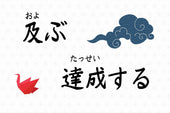
Difference Between 及ぶ (およぶ) and 達成する (たっせいする)
Both 及ぶ and 達成する can relate to "reaching" or "achieving" something, but they have distinct nuances and usage contexts...
-

JLPT N5 Study Guide: A Beginner's Roadmap to Acing the Test
If you’ve just started learning Japanese and are aiming to ace the JLPT N5, yo...
-

Beginner's Guide to Japanese Particles: Learn the Basics
TL;DR: Japanese particles are crucial for structuring sentences, acting like conjunctions or prepositions in English...
-

JLPT N5 Vocabulary List - All 748 Words You Need to Know
Vocabulary is the foundation of any language, and Japanese is no exception. The more you know, the better. Over time ...
-
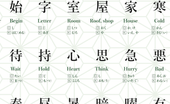
JLPT N4 Kanij List - All 176 Characters You Need To Know
After mastering the JLPT N5 kanji, you're ready to take your Japanese kanji game to the next level. JLPT N4. Let's go...
-
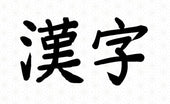
Kanji For Kanji - 漢字
Inception time. Which kanji compose the kanji of "kanji"? The kanji for "kanji" is actually pretty straightforward. I...
-

How to Memorize Katakana Easily: 9 Tips for Beginners
For those diving into Japanese, mastering hiragana and katakana is the first significant challenge. While hiragana o...
-
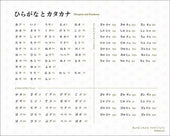
Complete Hiragana and Katakana Chart With All 112 Characters
The very first step for everybody who wants to learn Japanese is to study the hiragana and katakana chart (before lea...
-
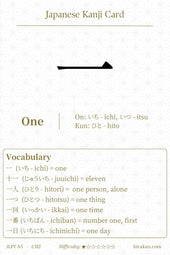
JLPT N5 Kanji: Kanji For One 一 (ichi)
Probably one the most simple kanji to remember, the kanji for 'one' is simply written '一'. Let's see its readings and...
-
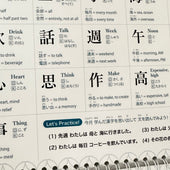
How Long Does It Take to Learn Kanji? A Beginner's Guide
Ask any Japanese student what's the scariest part of learning the language, and they'll say kanji. And they're righ...
-
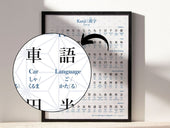
Is it Necessary to Learn Kanji? The Last Answer You'll Ever Need
Many beginners in Japanese wonder whether they should really learn kanji. I know this, because I also wondered when s...
-

How Long Does it Take to Learn Hiragana and Katakana?
As a beginner in Japanese, your first step is diving into the alphabets of Hiragana and Katakana. These are the build...
-

13 Best YouTube Channels to Learn Japanese, From Beginner to Intermediate
YouTube can be an incredible resource for learning Japanese. And best of all, it's free. So we've compiled a list of ...
-
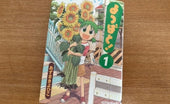
Top 10 Manga for Japanese Language Learners: From Beginners to Intermediates!
If you're learning Japanese, chances are you're interested in manga. So instead of reading texts about Tanaka-san s...

![~に来る – Expressing ‘Come to Do (Something)’ in Japanese [JLPT N5]](http://hirakan.com/cdn/shop/articles/ni-kuru-come-to-co.jpg?v=1769937520&width=170)
![~に行く – Expressing ‘Go Somewhere to Do Something’ in Japanese [JLPT N5]](http://hirakan.com/cdn/shop/articles/ni-iku-go-somewhere-to-do-something.jpg?v=1769937474&width=170)
![~にあります/~にいます – Saying Where Things and People Are in Japanese [JLPT N5]](http://hirakan.com/cdn/shop/articles/ni-arimasu-imasu-location-of-existence.jpg?v=1769251504&width=170)
![~がある・~がいる – Talking About What Exists in Japanese [JLPT N5]](http://hirakan.com/cdn/shop/articles/ga-aru-iru-there-is-are.jpg?v=1769251452&width=170)
![~すぎる – Saying Something Is “Too Much” in Japanese [JLPT N5]](http://hirakan.com/cdn/shop/articles/sugiru-too-much.jpg?v=1769251408&width=170)
![~く/~になる/~くする – Expressing Change with Adjectives in Japanese [JLPT N5]](http://hirakan.com/cdn/shop/articles/ku-naru-suru-expressing-change.jpg?v=1769251371&width=170)
![な形容詞 (Na-adjectives) – Basic Forms with です in Japanese [JLPT N5]](http://hirakan.com/cdn/shop/articles/na-keiyoushi-basic-desu-forms.jpg?v=1769251316&width=170)
![イ形容詞 – Basic i-Adjective Conjugations in Japanese [JLPT N5]](http://hirakan.com/cdn/shop/articles/i-adjectives.jpg?v=1769251251&width=170)
![~ます – Polite Present and Past Verb Forms in Japanese [JLPT N5]](http://hirakan.com/cdn/shop/articles/masu_-_polite_verb_form.jpg?v=1767433709&width=170)
![よ – Adding Friendly Emphasis in Japanese [JLPT N5]](http://hirakan.com/cdn/shop/articles/yo_-_ending_particle_Friendly_Emphasis.jpg?v=1767433517&width=170)
![ね – Softly Seeking Agreement in Japanese [JLPT N5]](http://hirakan.com/cdn/shop/articles/ending_particle.jpg?v=1766907843&width=170)
![何・だれ・いつ・どこ・どう – Basic Question Words in Japanese [JLPT N5]](http://hirakan.com/cdn/shop/articles/Question_Words.jpg?v=1766907708&width=170)
![ここ・そこ・あそこ・どこ – Talking About Places in Japanese [JLPT N5]](http://hirakan.com/cdn/shop/articles/places_fb57172a-7d06-47ee-a9b7-c1f4b6b2b264.jpg?v=1766305419&width=170)
![この・その・あの・どの – Using ‘This / That / Which’ with Nouns in Japanese [JLPT N5]](http://hirakan.com/cdn/shop/articles/acd351ada3fe4b04ae86de788a3350b8.jpg?v=1766305268&width=170)
![これ・それ・あれ・どれ – Saying ‘This / That / Which One’ in Japanese [JLPT N5]](http://hirakan.com/cdn/shop/articles/this-that.jpg?v=1766305107&width=170)
![か~か – Expressing Choices like “A or B” in Japanese [JLPT N5]](http://hirakan.com/cdn/shop/articles/choices.jpg?v=1766304827&width=170)
![~から~まで – Saying “From A to B” in Japanese [JLPT N5]](http://hirakan.com/cdn/shop/articles/from-AtoB.jpg?v=1765093560&width=170)
![まで – Expressing “Until” and “Up To” in Japanese [JLPT N5]](http://hirakan.com/cdn/shop/articles/until-up-to.jpg?v=1765093405&width=170)
![から – Expressing “Because” and “From/Since” in Japanese [JLPT N5]](http://hirakan.com/cdn/shop/articles/because-from_since.jpg?v=1765093285&width=170)
![や – Listing Examples with “And, Among Others” in Japanese [JLPT N5]](http://hirakan.com/cdn/shop/articles/and.jpg?v=1765093138&width=170)
![か – Forming Questions and Saying “Or” in Japanese [JLPT N5]](http://hirakan.com/cdn/shop/articles/ka-questions.jpg?v=1763787134&width=170)
![も – Saying “Also” and “Too” in Japanese [JLPT N5]](http://hirakan.com/cdn/shop/articles/mo-also-too_99f908e6-78d0-4f82-8319-391ef42764bc.jpg?v=1763787251&width=170)
![と – Linking 'And', 'With', and Quotations in Japanese [JLPT N5]](http://hirakan.com/cdn/shop/articles/to-and-with-quotation.jpg?v=1763265110&width=170)
![で – Marking Where and How an Action Happens in Japanese [JLPT N5]](http://hirakan.com/cdn/shop/articles/de-where-how-action-happens.jpg?v=1763264973&width=170)
![へ – Marking Direction ‘Toward’ in Japanese [JLPT N5]](http://hirakan.com/cdn/shop/articles/he-marking-direction.jpg?v=1762667986&width=170)
![に – Marking Time, Destinations, and Recipients in Japanese [JLPT N5]](http://hirakan.com/cdn/shop/articles/ni-marking-destination.jpg?v=1762667846&width=170)
![の – Possession and Noun Linking in Japanese [JLPT N5]](http://hirakan.com/cdn/shop/articles/no-possession-and-noun-linking.jpg?v=1761961297&width=170)
![を – Marking the Direct Object in Japanese [JLPT N5]](http://hirakan.com/cdn/shop/articles/o-direct-object.jpg?v=1761960990&width=170)
![が – Marking the Subject ('Who/What') in Japanese [JLPT N5]](http://hirakan.com/cdn/shop/articles/ga-subject-marker_60f30f70-6ca5-47ee-9a00-3646195d7d3c.jpg?v=1761386355&width=170)
![は (wa) – Topic Marker and Contrast in Japanese [JLPT N5]](http://hirakan.com/cdn/shop/articles/wa-topic-marker.jpg?v=1761385996&width=170)
![じゃない・ではありません – Expressing 'Is/Was Not' in Japanese [JLPT N5]](http://hirakan.com/cdn/shop/articles/janai-dehaarimasen_2594963b-531e-4f4d-a9b0-361010e0a720.jpg?v=1760865884&width=170)
![だ・です/だった・でした – Saying ‘to be’ in Japanese [JLPT N5]](http://hirakan.com/cdn/shop/articles/da-desu-datta-deshita_58bbc732-53fd-48da-83c7-4e477e7cc0b2.jpg?v=1760864506&width=170)
















